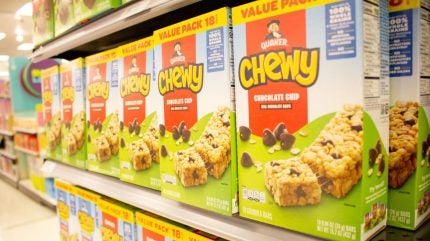

PepsiCo’s Quaker Foods division booked a first-quarter loss related to a product recall, which prompted the closure of a US granola bar and cereal factory in April.
Last December, the US Food and Drug Administration issued a recall for more than 40 Quaker Oats products due to concerns of salmonella contamination. Earlier this month, PepsiCo then permanently closed the facility concerned in Danville, Illinois.
The division, which operates as Quaker Foods North America, saw organic revenue decline 24%, reaching $593m. Meanwhile, PepsiCo reported an operating loss for the unit of $49m compared to a profit of $188m in the opening quarter of 2023.
“We recently announced our intention to close the manufacturing facility that was involved with the recalls and have resumed limited production on certain products affected by the recalls through other facilities,” chairman and CEO Ramon Laguarta said in his prepared remarks.
“We expect more production to resume in the coming months and expect the financial impacts associated with these product recalls to moderate as the year progresses.”
Quaker Foods, the breakfast foods and snacks division, also booked a volume decline of 22% in the opening quarter compared to 2023.
Access the most comprehensive Company Profiles
on the market, powered by GlobalData. Save hours of research. Gain competitive edge.

Company Profile – free
sample
Your download email will arrive shortly
We are confident about the
unique
quality of our Company Profiles. However, we want you to make the most
beneficial
decision for your business, so we offer a free sample that you can download by
submitting the below form
By GlobalData
Meanwhile, the group’s Frito-Lay North America (FLNA) division, which includes snacks like Lay’s crisps, saw a drop in operating profit. The metric fell to $1.55bn, from $1.6bn last year.
Chief financial officer Jamie Caulfield told analysts: “I think you’ll see margin improvement over time at Frito, but this is a business that has very healthy margins already, and we want to make sure that we’re investing back in the business to sustain growth.”
Laguarta added that the “key goal for Frito in the US is to continue to grow the salty, savoury category at a very high rate and continue to get occasions from other parts of macro snacks into the savoury, and from meals into savoury, and continue to gain share of that category as it has been doing”.
He said: “That’s the ultimate goal. If you think about the high margin that we have in that business and the impact it would have in the overall PepsiCo margins, that’s the role that Frito-Lay has in the portfolio.”
However, Robert Moskow, an analyst at TD Securities, said in a research report: “We think management’s description of the division as having “very healthy margins already” (now 28% compared to a peak of 31%) and set for further investment may have spooked investors who think that FLNA will need to introduce deeper discounts (especially with low-income consumers) to revitalise volume growth.”
Within PepsiCo’s international food and beverage markets, Latin America and Europe led gains in revenue, up 8% and 10%, respectively, to reach $2.07bn and $1.94bn.
Laguarta told analysts that the international businesses have been “an area of investment for us now for a few years, both in snacks and in beverages”.
He said: “We’ve been investing in capacity. We’re in the process of opening factories in Vietnam and in China and in India and in Mexico, and we just opened one in Poland. So we keep expanding our manufacturing and our go-to-market capabilities in those markets. So we feel good, and I think that it’s going to continue to be a big source of growth for us.”
The chief executive added that PepsiCo is seeing a demand slowdown in its business in China, as the “consumer is cautious and the consumer is saving a lot”.
Laguarta said: “The truth is that in China, our team is not only this year, but already consistently for the last four, five years, been gaining share and creating a very capable and profitable business in China we’re very proud of.”
PepsiCo’s total net revenue grew to $18.3bn from $17.8bn last year. Operating profit rose from $2.63bn to $2.72bn, while net income grew to $2.05bn from $1.94bn in the opening quarter of 2023.

